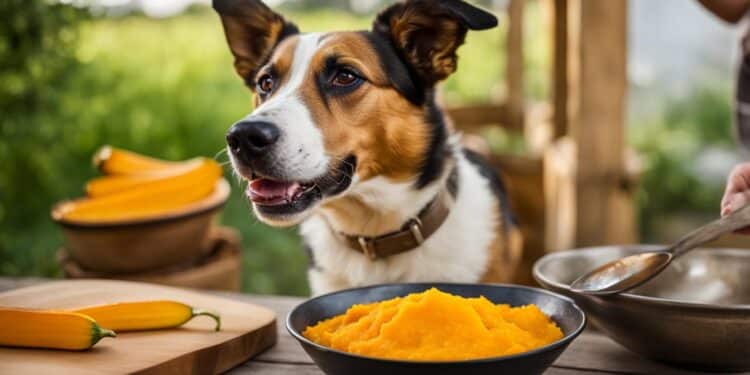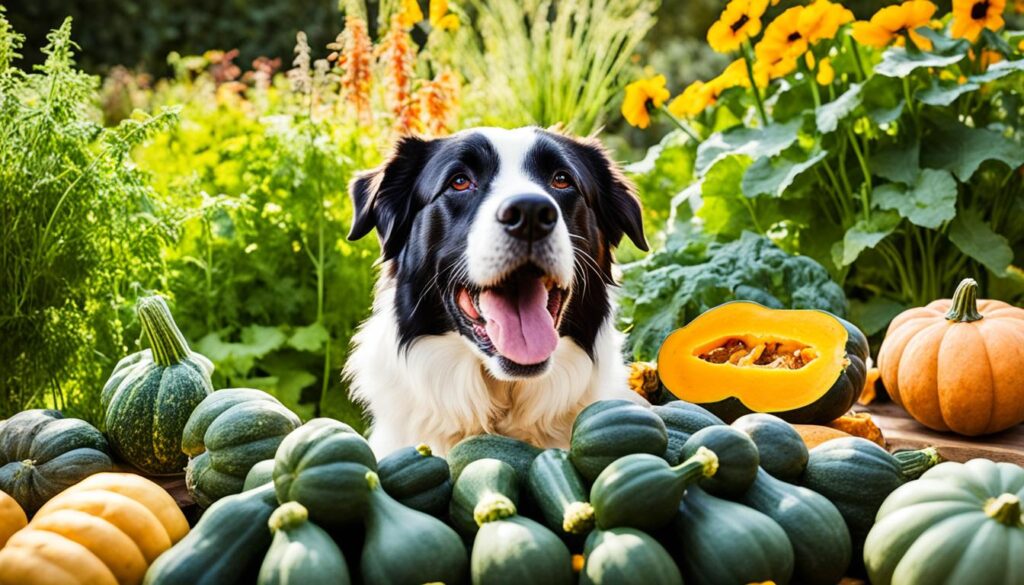Squash: A Healthy Addition to Your Dog’s Diet

When it comes to providing a balanced and nutritious diet for our dogs, it’s essential to explore a wide range of options. While we often focus on traditional staples like meat and vegetables, there are other healthy foods that can be incorporated into our furry friends’ meals. One such food is squash. Yes, you read that right – squash! It may not be the first thing that comes to mind when you think of canine nutrition, but squash can actually be a beneficial addition to your dog’s diet.
Squash is safe for dogs to eat, as long as you remove the seeds, skin, and rinds. The best types of squash to feed dogs are butternut squash, pumpkin, zucchini, and acorn squash. These varieties offer a host of health benefits and are packed with essential nutrients that can support your dog’s overall well-being.
Squash contains high levels of fiber, which promotes healthy digestion in dogs. It also boasts beta-carotene, a powerful antioxidant that helps protect your dog’s cells from damage. Furthermore, squash is rich in vitamin A, which is crucial for maintaining good vision and supporting overall cell function.
There are various ways to incorporate squash into your dog’s diet. It can be served on its own, in homemade treats, or mixed with their regular food. However, it’s important to serve squash plain and unseasoned, either steamed or roasted. By doing so, you avoid adding any unnecessary ingredients that may be harmful to your dog’s health.
As with any dietary change, it is recommended to consult with your veterinarian before adding squash to your dog’s diet, especially if they have any preexisting health conditions or are overweight. Your vet can provide personalized guidance to ensure that squash is a suitable and beneficial addition for your furry friend.
Key Takeaways:
- Squash, such as butternut squash, pumpkin, zucchini, and acorn squash, can be a healthy addition to your dog’s diet.
- It is important to remove the seeds, skin, and rinds before feeding squash to your dog.
- Squash is high in fiber, beta-carotene, and vitamin A, which can promote digestive health and support overall cell function.
- Squash can be served plain and unseasoned, either steamed or roasted.
- Consult with your veterinarian before incorporating squash into your dog’s diet, especially if they have specific health concerns.
Types of Squash for Dogs
Dogs can enjoy a variety of squash in their diet, providing them with essential vitamins and nutrients. Here are some types of squash that are safe and healthy for dogs:
1. Butternut Squash
Butternut squash is a popular choice for dogs due to its rich flavor and high nutritional value. It is packed with Vitamin C, which supports a strong immune system and promotes overall well-being.
2. Pumpkin
Pumpkin is another excellent option for dogs. It is known for its high fiber content, which aids in healthy digestion. Additionally, pumpkin is rich in beta-carotene, an antioxidant that supports eye health.
3. Zucchini
Zucchini is one of the most easily digestible types of squash for dogs. It is a great source of Vitamin B6, which plays a vital role in the nervous system and supports brain function.
4. Acorn Squash
Acorn squash is a nutritious choice for dogs, as it is rich in magnesium and B vitamins. These nutrients help maintain healthy muscles, nerves, and overall metabolic function.
When serving squash to dogs, it is important to remove all seeds to prevent any potential digestive issues. Squash can be prepared cooked or raw, but it should always be served plain and unseasoned, without any added seasonings or oils.
Fun Fact:
Did you know that squash belongs to the same family as cucumbers and melons? It’s part of the Cucurbitaceae family and shares many nutritional benefits with its relatives.
Including a variety of squash in your dog’s diet can provide them with essential vitamins, minerals, and antioxidants. However, it is always advisable to consult with your veterinarian before introducing any new food into your dog’s diet, especially if they have specific health conditions or dietary restrictions.
Benefits of Squash for Dogs
Squash provides many health benefits for dogs. It is high in fiber, which promotes digestive health. It contains beta-carotene, a powerful antioxidant that protects cells from damage. Squash is also rich in vitamin A, which is important for vision and overall cell function. Additionally, the different types of squash offer various nutrients and minerals that can benefit a dog’s overall health. Squash can also help hydrate the skin, improve the coat’s appearance, and support strong muscles, kidneys, and nerves.

| Type of Squash | Nutrients | Health Benefits |
|---|---|---|
| Butternut Squash | Rich in vitamin C | Supports immune system function and promotes healthy skin |
| Pumpkin | High in fiber and potassium | Aids in digestion and supports healthy heart function |
| Zucchini | Rich in vitamin B6 | Supports energy metabolism and promotes a healthy nervous system |
| Acorn Squash | Full of magnesium and B vitamins | Supports bone health and enhances energy production |
Squash offers a range of health benefits for dogs, making it a valuable addition to their diet. Incorporating squash into their meals can provide essential nutrients, promote digestive health, and support their overall well-being. However, it is important to consult with a veterinarian before introducing squash or any other dietary changes to your dog’s routine.
Conclusion
Incorporating squash into your dog’s meals can be a beneficial way to enhance their diet with essential vitamins, minerals, and nutrients. Squash is a nutritious option that supports overall health, but it’s important to serve it in moderation and as part of a balanced diet.
When adding squash to your dog’s diet, remember to remove the seeds and serve it plain and unseasoned. This ensures that your dog receives the maximum benefits without any potential digestive issues. You can choose to serve squash cooked or raw, although steaming or roasting is recommended for better digestion.
Before making any dietary changes for your dog, it is always recommended to consult with a veterinarian, especially if your dog has specific health concerns. They can provide guidance based on your dog’s unique needs and help you incorporate squash into their diet safely and effectively.
Adding squash to your dog’s meals can be a simple and nutritious way to enhance their overall health and well-being. So, why not consider incorporating squash into your dog’s diet today?
FAQ
Is squash safe for dogs to eat?
Yes, squash is safe for dogs to eat as long as the seeds, skin, and rinds have been removed.
What are the best types of squash to feed dogs?
The best types of squash to feed dogs are butternut squash, pumpkin, zucchini, and acorn squash.
What are the benefits of squash for dogs?
Squash is high in fiber, beta-carotene, and vitamin A, which can benefit digestive health, protect cells from damage, and improve vision and overall cell function.
How should squash be served to dogs?
Squash should be served plain and unseasoned, either steamed or roasted.
Can squash be added to a dog’s regular food?
Yes, squash can be mixed with a dog’s regular food or served on its own.
Should I consult with a veterinarian before adding squash to my dog’s diet?
Yes, it is important to consult with a veterinarian before adding squash to a dog’s diet, especially if they have any health conditions or are overweight.
Can dogs eat raw squash?
While dogs can eat raw squash, it is recommended to cook it for better digestion.
Are there any risks associated with feeding squash to dogs?
The main risk is the presence of seeds, which can cause digestive issues if not removed before feeding squash to dogs.






